|
|
|
Sort Order |
|
|
|
Items / Page
|
|
|
|
|
|
|
| Srl | Item |
| 1 |
ID:
152296
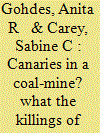

|
|
|
|
|
| Summary/Abstract |
An independent press that is free from government censorship is regarded as instrumental to ensuring human rights protection. Yet governments across the globe often target journalists when their reports seem to offend them or contradict their policies. Can the government’s infringements of the rights of journalists tell us anything about its wider human rights agenda? The killing of a journalist is a sign of deteriorating respect for human rights. If a government orders the killing of a journalist, it is willing to use extreme measures to eliminate the threat posed by the uncontrolled flow of information. If non-state actors murder journalists, it reflects insecurity, which can lead to a backlash by the government, again triggering state-sponsored repression. To test the argument whether the killing of journalists is a precursor to increasing repression, we introduce a new global dataset on killings of journalists between 2002 and 2013 that uses three different sources that track such events across the world. The new data show that mostly local journalists are targeted and that in most cases the perpetrators remain unconfirmed. Particularly in countries with limited repression, human rights conditions are likely to deteriorate in the two years following the killing of a journalist. When journalists are killed, human rights conditions are unlikely to improve where standard models of human rights would expect an improvement. Our research underlines the importance of taking the treatment of journalists seriously, not only because failure to do so endangers their lives and limits our understanding of events on the ground, but also because their physical safety is an important precursor of more repression in the future.
|
|
|
|
|
|
|
|
|
|
|
|
|
|
|
|
| 2 |
ID:
162093
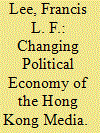

|
|
|
|
|
| Summary/Abstract |
Most observers argued that press freedom in Hong Kong has been declining continually over the past 15 years. This article examines the problem of press freedom from the perspective of the political economy of the media. According to conventional understanding, the Chinese government has exerted indirect influence over the Hong Kong media through co-opting media owners, most of whom were entrepreneurs with ample business interests in the mainland. At the same time, there were internal tensions within the political economic system. The latter opened up a space of resistance for media practitioners and thus helped the media system as a whole to maintain a degree of relative autonomy from the power centre. However, into the 2010s, the media landscape has undergone several significant changes, especially the worsening media business environment and the growth of digital media technologies. These changes have affected the cost-benefit calculations of media ownership and led to the entrance of Chinese capital into the Hong Kong media scene. The digital media arena is also facing the challenge of intrusion by the state.
|
|
|
|
|
|
|
|
|
|
|
|
|
|
|
|
| 3 |
ID:
073763
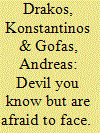

|
|
|
|
|
| Publication |
2006.
|
| Summary/Abstract |
Despite substantial progress in the applied study of terrorism, one important methodological issue has remained underdeveloped. Multiple warnings have urged for caution as the validity of extant findings may have been distorted from the well-known "devil" of underreporting bias. Yet, extant research has fallen short from addressing the issue in a systematic fashion. This article discusses a way for assessing whether underreporting is present by using the widely studied relationship between terrorism and regime type as its laboratory. After formally presenting a setup for the accommodation of underreporting bias, the authors discuss how it relates to press freedom. According to their results, underreporting is indeed present, implying that the used databases for terrorism represent an understatement of the true number of terrorist incidents.
|
|
|
|
|
|
|
|
|
|
|
|
|
|
|
|
| 4 |
ID:
162469
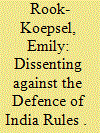

|
|
|
|
|
| Summary/Abstract |
Indian democracy has been plagued by a long history of ‘rules’ and ‘acts’, defined broadly as assigning to the state the power to impose order, but without clear guidelines as to their use. Understanding agitations against these rules and acts is helpful in seeing a line of challenge to state authority from the position of democracy. This paper will describe the agitations by the All India Newspaper Editors’ Conference (AINEC) against Article 41 of the Defence of India Rules (1939), which focused on the government's ability to censor, ban and fine newspapers. AINEC's fight made visible the effect of capricious and unpredictable government actions on actors outside the elite. In addition, the shifts in censorship brought about by the Defence of India Rules highlighted how groups, ideas or writing could shift from being regarded as ‘responsible’ and credible to ‘irresponsible’ and dangerous on the basis of state decisions.
|
|
|
|
|
|
|
|
|
|
|
|
|
|
|
|
| 5 |
ID:
177980
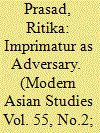

|
|
|
|
|
| Summary/Abstract |
Examining cases of libel between 1780 and 1823, this article analyses how the theory and practice of press regulation and governmentality was initially articulated in colonial India, embodied in everyday transactions between the newly invented East India Company state and an emerging newspaper press. While Company officials recognized that scrutiny by a free press was central to establishing their fairly new claims to just governance and public legitimacy, they feared that public critique would destabilize the very sovereign authority that they sought to establish. Concerned with appearing arbitrary, officials developed strategies through which they could demand obedience without necessarily predicating it on censorship. Journalists derived much of their negotiating power from the early colonial state's vulnerability to public scrutiny, but they also knew that the state possessed extensive control over their livelihood. Cognizant of the power and constraints of colonial governmentality at this juncture, they produced their own mechanisms of permissible intransigence. This uneasy equilibrium generated the questions explored in this article: What rights of comment and critique practically accrued to newspapers? What was the legal authority of executive regulations censoring newspapers and how far were these enforceable? Why, in practice, did punishments remain strikingly similar across periods with and without formal censorship? The cases between 1780 and 1823 not only reveal the historical negotiations that structured this foundational—though somewhat marginalized—period of India's press history, but also explain the strategic shifts that followed as, in 1823, the fulcrum of crime and punishment turned away from press censorship and towards press licensing.
|
|
|
|
|
|
|
|
|
|
|
|
|
|
|
|
| 6 |
ID:
086476
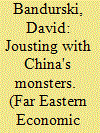

|
|
|
|
|
| Publication |
2009.
|
| Summary/Abstract |
China has suffered a succession of crisis over the last two years stmming from official corruption and negligence. All have dialed up the heat on simmering resentment of the government, and more than a few have erupted into full blown public protests.
|
|
|
|
|
|
|
|
|
|
|
|
|
|
|
|
| 7 |
ID:
022809
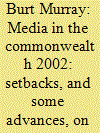

|
|
|
|
|
| Publication |
Sept 2002.
|
| Description |
467-550
|
|
|
|
|
|
|
|
|
|
|
|
|
|
|
|
| 8 |
ID:
129002
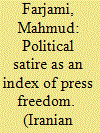

|
|
|
|
|
| Publication |
2014.
|
| Summary/Abstract |
Political satire has had a prominent part to play in the social and political sphere of journalism in Iran since the appearance of an independent press in the country at the beginning of the twentieth century. This paper examines the problems of political satire in the Iranian press during the 2000s with respect to their historical context during the past century. The paper argues that, addressing the essential relationship between satire and criticism, and the primary role that criticism has in the freedom of press, what happened to political satire and satirists in Iran can be seen as an index of the freedom of the press and journalistic expression for an era.
|
|
|
|
|
|
|
|
|
|
|
|
|
|
|
|
| 9 |
ID:
127621


|
|
|
|
|
| Publication |
2013.
|
| Summary/Abstract |
The ouster of authoritarian President Kurmanbek Bakiev in April 2010 was heralded as opening the door to a new era of human, press, and political rights protections in Kyrgyzstan. However, the interim administration of President Roza Otunbaeva and the accession of her democratically elected successor, President Almazbek Atambaev, on 1 December, 2011, failed to produce the anticipated, significant commitment to restore and safeguard press rights. Drawing on interviews with journalists and mass media experts in Bishkek and Osh, this article examines the press rights situation and restraints in the first year of the Atambaev administration. It concludes that achievement of a strong press rights record will be neither easy nor swift in light of Kyrgyzstan's Soviet-era and post-independence history, economic constraints, and political fragility.
|
|
|
|
|
|
|
|
|
|
|
|
|
|
|
|
| 10 |
ID:
134129
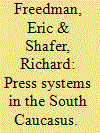

|
|
|
|
|
| Publication |
2014.
|
| Summary/Abstract |
This article examines the contemporary press environment and existing research on the press-including the role of new media in Armenia, Azerbaijan, and Georgia. In the early 1990s, these successor states emerged from the dismantled Soviet empire to form new governments, press systems, and other national institutions. Each was nominally committed to developing free enterprise-based economies and democratic governance. The article discusses the press after they became part of the U.S.S.R., critiques the three national press environments, and examines how rapid expansion of social media use is blurring traditional definitions of journalism. Last, it concludes that significant obstacles remain to development of functional, effective press systems that can maintain economic and political autonomy and plurality in the South Caucasus.
|
|
|
|
|
|
|
|
|
|
|
|
|
|
|
|
| 11 |
ID:
179067


|
|
|
|
|
| Summary/Abstract |
In December 1983, the United States announced its intention to leave the United Nations Educational, Scientific, and Cultural Organization (UNESCO). Great Britain followed suit shortly thereafter and formally withdrew in 1985. The principal reason for these dramatic departures was UNESCO’s alleged “hostility toward the basic institutions of a free society, especially a free market and a free press.”1 Both the United States and Great Britain complained that Third World representatives were undermining the free flow of information, a value that the agency’s Constitution vowed to defend. Over the previous decade, many UNESCO delegates had questioned the fundamental tenets of liberal press freedom by advocating for a New International Information Order (NIIO), which called upon governments to guarantee fair media content and to globally redistribute information technology. Whereas North Atlantic countries emphasized negative press freedom, principally freedom from state interference, representatives from decolonized, non-aligned, or so-called developing nations—what I refer to as the Global South—argued that news could not be left to market forces, as this would undermine other freedoms such as economic sovereignty.2 Seeing this stance as a communist conspiracy, North Atlantic delegates roundly rejected corresponding proposals to reform UNESCO, leading to the ultimate withdrawal of the United States and Great Britain.
|
|
|
|
|
|
|
|
|
|
|
|
|
|
|
|
| 12 |
ID:
077320
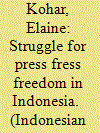

|
|
|
| 13 |
ID:
137920
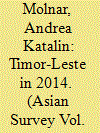

|
|
|
|
|
| Summary/Abstract |
Reports of the diplomatic row with Australia and anxiety over Prime Minister Xanana Gusmao’s prospective resignation dominated 2014. Articles of a highly controversial Media Law were declared unconstitutional by the Court of Appeal in September. Timor-Leste hosted the 10th Summit of Heads of State and Governments of the Community of Portuguese Speaking Countries.
|
|
|
|
|
|
|
|
|
|
|
|
|
|
|
|
|
|
|
|
|